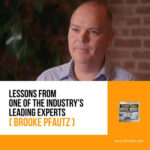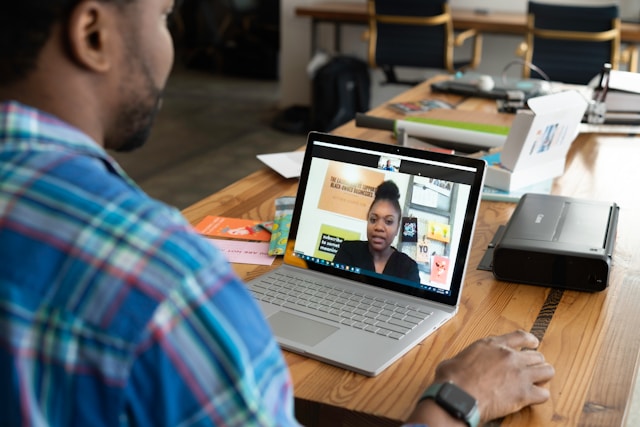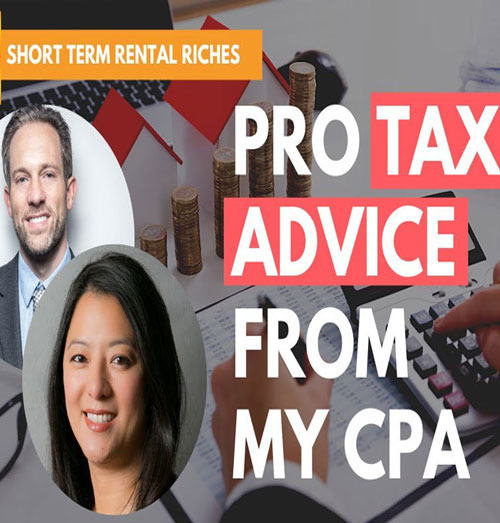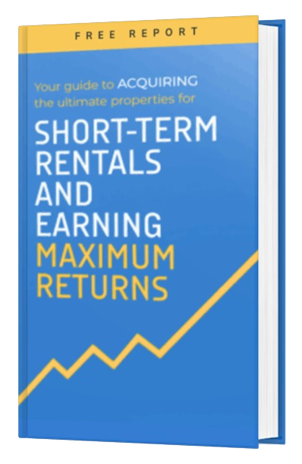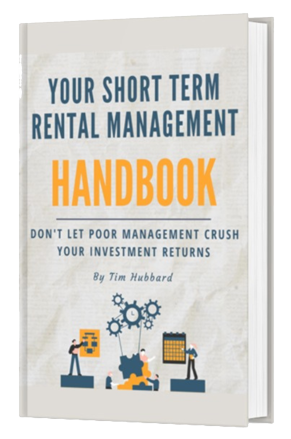How to build an Airbnb Business: Lessons from one of the industry’s leading experts (Jonathan Farber)
There is a lot to learn in the short term rental industry. The environment is constantly changing; new tools, tips, markets to look for, and best practices to incorporate into your short term rental (or your upcoming purchase.
Too much to learn in fact that there is no way for me to process it all myself. So to change things up a bit I’ve decided to bring on a few other experts in the space.
This week we meet with Jonathan Farber. John is the real deal. He also happens to spend half of his year in Medellin, Colombia where I ran into him and have had the pleasure to meet up with several times afterwards for dinner and drinks.
I’ll let John tell his own story on the episode but just know that he brings some EXPERT tips. Join us this week as we discuss with a fellow short term rental expert:
- Why having virtual team members is necessary
- Best practices for hiring your own VA
- How your team can “train themselves”
- How traditional management can hurt (or crush) your STR returns
- The current economic and industry outlook
- What it means to live a “Rich” life
Make sure to catch Johnathan on his popular podcast – Millennial Millionaires. You can also find out how to work with John and have real estate deals hand picked for you by going to:
Are you enjoying the podcast? Please subscribe, leave a rating and a review, and share it! This helps us reach others that may find the info helpful as well.
Get a copy of my 12 proven house rules to protect your property from almost every negative situation (highly recommended)
You can find all of our links here including our website, recommended resources, upcoming live events, short-term rental playbook, Instagram, and more!
Click Here to view TranscriptWelcome to short-term rental riches will discuss vesting in real estate but with a specific focus on short-term rentals quick actionable items to acquire manage and scale your portfolio. I’m your host Tim Hubbard.
Tim: Welcome back to the Short-term Rental Riches podcasts. We got an extra special episode today. As most of, you know, we don’t have a lot of interviews on the show but I thought it’d be a good idea to bring on some other experts because there are a lot of experts out there in this big world. And one of them happens to be my friend, John Farber, and I’m really excited to have him today. Welcome to the podcast John
John: I’m excited to be here, man. I was thinking about it, you probably came onto my show like to and he looks three years ago at this point two to three years ago but I remember you. You’re, you were ahead of me. Still are ahead of me and I like not just an age but also an experience.
Thanks, thank you. You feel like I remember the time and I was still living in North Carolina and you planted the seed in my head that this was possible. Like I had some properties. But anyway, like yeah, it just funny. I was thinking about that right before you hit record. Yeah, you came on mind. I remember like seeing you in Colombia and I was Man like that’s just awesome like he’s out there is business can run in the US or online whatever and like in my head maybe it subconsciously was the first seed that got me thinking maybe I want to follow that similar footstep that maybe I want to actually come to Colombia too and then I actually came and then you left but you know I’m here Del and but yeah man that was like two or three years ago but now it’s exciting to be on and just always great catching up.
Tim: Yeah. Well, I didn’t know that part but that’s good to hear. And it’s yeah, we’ve met in person so a It’ll more on John’s backstory. I mean, he became financially free at an early age. He has a great podcast, Millennial Millionaires and he’s really, really doing the thing. So today, I think we’ll just talk about short-term rentals but I want to talk a little bit about the lifestyle that we can have, if we’re financially free, right? And that living in Medellin. I’ve for those of you out there, I met John in Medellin. So, we’ve had dinner a few times and he’s just really really do in the thing. So, shoot so many places to start here. Why don’t you just give us a little more about your background John and how you got into real estate and just kind of got started
John: Maybe used to say this. I don’t really say it as much anymore but here’s how I would describe it. I was not special in any way for any business background or pedigree. I was just working as software job, I always have been able to focus on things but like I always wanted to become financially free. I always wanted a maybe not work for someone have time, Freedom, be able to work and live in different places like Columbia or travel.
But I say that because like anyone can follow, I think my story of if you have a job and you start aside hustle and you maybe by a few properties your property to, you could do with creative financing or, you know, very little money or partners. And if you do it that way, you could slowly chip away and achieve that, you know, whatever. It’s that term, Financial Freedom. Financial dependence, whatever you want to call it. But my background was pretty like vanilla and a sense of I got a job. I didn’t love it that much. There was a huge layoff at the company that really freaked me out because I saw people way ahead of me get laid off from a job. So, I was then thinking, what can I do to protect myself? Everyone told me my whole life at the job was safe and secure and I just saw these people get laid off. Some like doesn’t seem that safe and secure. So, for me it was all about, then channeling my job to buy income streams. I wanted to make as much money as I could in this vehicle, this job by more real estate. So, for me it was like just start to stack up one or two properties a year, try to optimize them and see what was the best strategy to make the highest cash flow and then it became furnished rentals. When I learned about it and like, 2018, 2019 started to shift into that Furnishing the regular rentals. I had buying rentals, just for strs and kind of going about it that way. I also got really big Like interested in the world of virtual assistants which I know you have tons of.
Tim: Yeah, I want to dig into that a little bit more to, so let’s not forget them
John: 100%. It’s become a big passion of mine, just with everything. That’s the other thing. I remember, when we first met, I was like, Tim is the real-life Tim Ferriss that I’ve ever met. I remember thinking that if I had, I was like this guy is just like it like if I’d actually be a little cooler. But anyway, I was like that. Could be my new goal like again. Maybe subconscious. Maybe not. But anyway, yeah. So then just started. Doing it more covid hit. And I really saw that as an opportunity to pour gas on to this thing, to kind of work remotely, go travel around me, Brokers meet different people, and kind of looked at it. Like had to speed this up before I had to go back to maybe my office, which is only, like, one or two days a week, but I still didn’t like it. And, you know, things took off from there. That’s when I started creating content and all that. And that’s when we met and that’s like the background and then today just do more deals virtually. We were talking about, you know, I live in Colombia. Half the year and then I live in New York. The other half passion of mine is playing tournament golf. I play like 20 to 30 20 minutes of summer so I practice here, hanging out. And then in the summer, pretty much like let the business run itself. I have a director of operations now that can handle a lot of the day-to-day from me knows that summer months. I’m kind of just playing golf. I’ll check on stuff, but I want it to be able to run sort of with her without me. Of course, there’s things that I get pulled into but that’s the gist. So, beginning to now kind of, what’s up? And yeah, we’re in Columbia.
Tim: Well, I I know you got, you got a ton of experience. What is your portfolio look like today with short-term rentals? Are your in multiple markets or you focus on
John: Mainly in North Carolina have eight STRs there. And then in Louisville Kentucky have a 24-unit apartment building with a few partners and
Tim: Probably going to look to do trying to buy or do a deal like once a quarter. So, kind of us, like my thought is for every Str I do. I want to do a regular deal as well. Just for diversity and
John: Why not? Like they’re both, great both have pros and cons. So, try to mix in a little bit of everything but that’s that’s the current setup.
Tim: Yeah, you know, a lot of our listeners know my portfolio similar to, you know, I got into real estate for passive income to live the life that I wanted to live, right to travel. And so, for me that wasn’t like, oh I need to do short-term rentals. It’s just that short term rentals happen to be making a much higher return than a lot of my other portfolios. So, there are a lot of my other properties, but there is a balance there, right? They all come with different risks, different rewards, even just in the short-term rental Niche. So, you know, we can compare a luxury vacation rental to an urban city apartment, and they all kind of sort of operate differently, but I guess the goal is just having a good balance that works and allows you to do what you want to do, right? So, I think that’s an awesome goal, 1, 1 for Recorder and got the team that to help you. I know you’re a golf Master, which is great. And I know the golf course is down there. So, I am not by any means. I mean I’ve I’ve I’ve hit a few balls but I’ve played the course down there in Colombia or one of the ones in Medellin. And it was probably the last time ran out of balls, ran out of balls and no more. Yeah, that’s that’s awesome. Well, Let’s see here, tell us about your virtual team because this is a big piece and it’s really necessary. If you want to be living wherever you want to write, if you want an operation run without you
John: I just made something about this, but basically virtual assistants are like a cheat code. I think in any business and I think in 2023 more than ever, any business, especially in Property Management business, where atypical Property Management business, the returns and the margins are pretty bad. And it can be pretty time-intensive like, it should almost be mandatory business operations to have virtual assistants helping with some of the virtual tasks you my opinion but it could be any business. Like I’ve helped friends now that our chiropractors or dentists have a virtual assistant as a receptionist to handle like anything messaging or even one of them has now, just her chilling on an iPad. Just greeting people, they walk in like it was a covid, kind of experiment and now that’s Bob.
Yeah. So, you know there’s like different ways to do it but for me I just got really interested in it and I started with one I just started actually with content creation having a VA help with podcast editing and video editing because it was very simple and very like modellable compared to other things. So, just started with that. And then once I got kind of a taste of, it saw there was a lot of other possibility with it deal analysis, Property Management, email management. A lot of other little nuances to social media indifferent platforms. So, for me, now, the team is actually just hired. I guess it’s about 10 people now, between, like, I would say, full time and people that are almost full time. But, you know, to be honest, that might be the cost of two American people. We were just evaluating this today. This is actually really important point. I was evaluating, there’s a person on our team that, you know, were trying to decide what their role is going to be and I was thinking for what they’re making we could probably hire four or five more people that are really qualified in really good.
There’s someone in our team is making 5K a month. You can find a virtual assistant that’s making 1K and very happy, you know, like given here in Columbia. I’ve talked to people they work in call centers and make five or six hundred dollars a month and they have to go to an office every day and they hate it. So, just to Preface on both sides. Like some people might be hearing. Oh my God, paying someone a thousand a month. Maybe double what they’re making in their current country and they don’t even have to commute if they work for you. So, that’s the current team, it can span for us deal. Finding Property Management, social media management, personal assistant, then just miscellaneous operational tasks that pop up, like data scraping things like that, but wouldn’t be able to do we do without it. I don’t think I’d want to do it the traditional way, just because also like and you know this, I’m preaching to the choir here. They have just amazing mentalities compared to Um, of the hate to say it, I’m American, but like, compared to some of the American entitled attitude. It is ridiculous, man.
When you talk to someone, that’s 22, 23 years old coming out of college in the US no experience, they think they should be making eighty thousand dollars. Dude, you haven’t done anything, you have no skills whatsoever. Like, you should be in the learning mode. Instead of I’m not taking this job unless I make 80 K mode. So, I guess I’m a little sick of that too. The culture and the values that I found overseas, or even in Colombia, just very different, like grateful, excited energetic like willing to learn bringing ideas, so definitely on the soapbox there but that’s like my view.
Quick news flash.
If you’re looking for a passive short-term rental investment. The reality is, you will never have one if you are always involved. It’s not a passive investment if you are the one communicating with guests, coordinating operations and issues just to name a few. So, what do you do? You can (one) hire a property manager, but traditional commissions can really hurt your profits. You can (two) hire your own team, but this comes with its own challenges and it doesn’t make financial sense for most people. I’ve dedicated years and hundreds of thousands of dollars through trial and error to figuring out how to manage my personal portfolio remotely, and it wasn’t always easy. And it took a long time but now my amazing team can professionally manage my properties without me and good news. Our team can also manage yours. Let us save you the stress and headaches and some money by offering you an Industry Low Fee. To find out more about partnering with us head to strriches.com hit the property management button answer couple quick questions and meet with me personally that’s strriches.com. Rest easy, knowing that with my team, your properties will be in excellent hands.
Tim: No, it’s a huge part of it can be such a huge part of someone’s short term operation. And so, one of the things that I love like we have access to the whole world, it’s easier than it’s ever been. People want most. People want the ability to work remotely, they don’t have to drive to work and do all of that and there’s just so much talent out there. I mean, it really is exciting, it really is exciting and it’s just creating a whole new era, right? I mean and also for us that want to be able to live anywhere like our team is mainly in the Philippines and Mexico now. But you know I kind of bounced around I am virtual as well and then we have people in the US that are helping to manage properties and other states that are virtual as well. All. And so, it just really, it’s really exciting. And we talked a lot about that topic on this channel. I found it really interesting when Airbnb announced that anyone could work remotely, and I think they have about 6,000 employees and within a month or so after advertising that anyone on, in their company could work remotely, they had a million or so people visit their career page. I mean, that’s why it’s just there’s so much talent out there and really all over the place, you know. I mean and so that’s exciting for people to short-term Rental World. People that haven’t got into it. People don’t want to work remotely. People that want to be able to travel. It’s just really opening up the world, but it’s not always easy to hire a virtual assistant or someone helping you virtually. So, what are some of the things that you do to try to help manage those virtual relationships and make sure that people are staying productive and those types of things.
John: So, this is the whole like nuts and bolts of it. They may get excited about virtual assistants, but then if you don’t get this next part, right, it’s probably going to be a failure. So, getting the hiring and the onboarding and the managing, and the goal setting, right? Is so important, I think to have success, because I’m sure you’ve talked to people, to, maybe in the US, I’ve talked to quite a few that say, oh, I tried hiring a virtual assistant. It didn’t work. Well, okay, let’s peel back. What was actually going on? Like, what did you give them as instructions? Did they have training did? Did you have them set up with your tools? Like how often were you talking to them? You know, and then when you peel that back you’ll figure things out. So, first and foremost, I think it’s important to think about and this is not a good distinction, we make.
If the person has experienced, we’re going to pay them more, but we’re going to expect to train them less, it sounds simple, but it’s something people often miss where people will hire someone to do something. They’ve never done. And they’re hiring someone that has no experience with that thing. And then they wonder why they can’t manage or train that person. And it’s because neither people know how to do it. So, if we do go with that route which sometimes, we do now, will either hire someone that has experience and we give them clear goals and if they don’t give us signs, that they’re going to achieve those goals in two to three weeks. We just let them go on the other side of it if it’s someone that is in experience, but we’re getting for a lower price but will do is one invest in training for them so that they can learn as we learn.
Like for example we just hired a new content VA yesterday they’re going to help us with just LinkedIn and launching a new course that we want to launch for both of those activities. We bought products and we bought courses for them to follow steps and learn alongside of us. So, we bought them. Justin Walsh has LinkedIn, Playbook and then we bought them a course. Creator course, for using a new tool that we want to ramp up when we launched our new course, okay? So, they’re going to just be able to follow step-by-step and we don’t have to train them but they That much experience or not going to have to pay them as much as someone that might. So, it just depends I think if you hire someone that’s new, you should be investing in training or you’re going to be doing the training yourself. And if you’re hiring someone that has experience, I think you need to be very quick to hire and fire those people because they can say one thing. But if they’re not showing you signed of performance really early on then it’s just not going to work. That’s something that we have to learn. We would keep people on way longer than we should have. When we knew it wasn’t going to be a fit, you know? Pretty quick. If someone doesn’t have that communication style or that energy or that attitude that you want my advice, just fire them right there.
It’s better for both people. You’re not stringing them along and you’re not hurting your own company. So, I have a bunch more like a little tactics but those are just some high-level things, but if you want me to dig into some tactical stuff or however you want to go with it.
Tim: Yeah, so great tips are John, I think that, you know, the interesting thing with training is like, you know, I’ve hired a lot of people On the US and they didn’t work out. Well either. And again, it comes back to training and setting goals and making sure that everyone’s on the same page. There are a lot of ways to do that. One of the things I like working with virtual assistants really. I guess this could be anywhere but there’s so many resources available online right now, right? Just like your course for Content that you had one of your team members watching. I mean, sometimes we’ll just say find the best YouTube channels that talk about this specific topic, how we can improve it and let us know what you learned. And so, I like to do that and I have a daily sheet that all of our team members fill out and that’s one of the questions we have on there is what did you learn today? And we kind of give them free rein, you know, it can be on podcast.
It’s kind of funny. A lot of my team. Actually, they listen to all my podcast because it’s it helps train for the short-term rental space, but they also get to Know me a little better, I guess at the same time. So, I guess you could do similar things since with your podcast and some of the content you have.
John: so, one little quick thing that just I think some listeners might find important. I got this from a guy named Michael Hyatt. One of my favorite books about free to focus. He thought about everything that they do and their company, they record the steps they create videos for it, and then it’s used for two purposes, internal training, but it also becomes products that they sell and when I heard that it just clicked with me. Like, if we use an ocean database for our Airbnb management process that we use with cleaners or internal tracking, why not give it as content or sell it? Other people might want it too. If it’s working for us and when we had that kind of like shift in thinking and made our whole process different because now, we built everything, so cheesy. I can’t live just like ripping off cliches, here. It was like built to sell like we would build it knowing that it would be packaged up and seen by other people. So, we would build it a little cleaner or think about a little bit more like thoughtfully instead of just not having a process. So that was really important but can I ask you a question actually? Tim, I want to hear like more about that daily sheet because I’m always I’m like just I love hearing out about the stuff. I found it really interesting just different people’s business operations. Like for us, we use like slack, they do like a morning check-in and an afternoon check-in and notion. But could you tell me more or tell everyone? I About, like the way that your VA’s communicate with you or with a manager and then like use a sheet to log like what they did that day, or what’s going on?
Tim: We have a simple Google form that each team member fills out. It says, today’s date. What did Ido today? What can I help you with? And so, I don’t review with all of our team members regularly. Some of them might be every few weeks, or maybe, even every month or longer or some of our other team members are managing other members. And so, they do the reviewing. But I think the process is the same for for any step. And it just allows you to, you know, let’s say someone fills out their daily checklist for two weeks and you haven’t talked with them. Well, any questions, any issues that came up that maybe weren’t urgent and came across from a slack Channel or from something else, you have it there. So, you can kind of pick up on all everything. Make sure you don’t miss anything. I like to add another one in here to John. And this one, this one is cheesy. But it says, what am I grateful for today? And it’s not required like not everyone has to fill it out. Not everyone does every day but they do pretty often and it’s cool to go in because it’s a little more challenging to build a relationship working with people virtually than it is in an office. For example, right? We’re not seeing them all the time, especially if we’re not meeting with them all the time. So, it allows you to kind of get a little bit of their personal life without being too intrusive. You know, might say, you know, I enjoyed a fabulous cup of coffee today or I enjoyed going out for or walk with my dog, you know, so it’s kind of just brings in the person side to to the job. But yeah, it’s a basic Google form and it all every time they fill it out, it goes into an Excel sheet on the background. So, the Google forms are free. So, we use those for a lot of things, but it’s been a good really easy tool to anyone can use working with anyone virtually.
John: So, every person team has their own Google form like length and there that’s just Form that they fill out daily and then you could check it whenever you want.
Tim: And the cool thing about it is like if you change tasks that you’re working on, you know, a team member changes their roles or something changes. All you have to do is then edit that form and add another question in there and then that just becomes something that they’re seeing every day and responding on. And so, it’s kind of like our checklist that we use for housekeepers, where we have, certain things that we want them to do all the time. And we use Breezeway for Oliver housekeeping checklist.
We’ve talked about that a prior episode, but it basically allows us to keep a checklist for a specific person or role in, edit it whenever we need to, and either way. So, if someone’s refilling a task every day that they don’t need to well then, we can take it off but if they’re missing something every day, then we can add it on. So, I like the I like Chad Qualls. Yeah. Sure, it’s great with VA. That’s a really important thing that’s really important. Well alright let’s let’s see her John’s so we know that the VA product you know, having a remote team is easier than ever. We’ve got to make sure that we’re training them properly but this really can free up a lot of time. It can be a lot more affordable especially if we’re learning American dollars because they’re stronger than they basically ever have been part of the reason they’re stronger though is because we’ve got some crazy things going on in the economy and so as a real estate investor just to get your outlook on today’s environment. And if you’ve changed strategies strategies or anything maybe versus this time of year ago,
John: We’re definitely a little more conservative now, or definitely analyzing more deals before making offers. I think we’re looking at every deal now a little bit more with what’s our exit strategy or what’s our worst-case scenario. We always looked at that but now we just want to be more careful. As far as things with like, interest rates at home prices, what we’re seeing, it’s not preventing us from doing anything and talking to other people that are in the space of hasn’t prevented them. Either with just a little bit of a pivot because a year ago prices were really high and rates were really low. So, your monthly price, you know was one price. Now prices are down but rates are up. So, the price is still might be similar in a monthly payment but we’ve seen over the last let’s say Two months. Is that rates have started to drop slightly and prices are still lower. We’re dropping like rates. I think maybe five months ago were seven or eight percent for a lot of the loans we were looking at now we’re seeing loans back in the upper 50s, low 60s and the home prices are still what they were, what we’ve seen five or six months ago dropping. So, we’re just more careful. We’re definitely looking at more deals. We’re offering on deals that may be Beyond, would be. Market longer and we can be more aggressive.
Our methodology is always just to make a lot of offers you don’t know what’s going to happen. So, we’re trying to make maybe last year would have taken 10 offers to get a contract. Now might take 20 and we’re going to look at the deals a little more closely. Maybe we’re talking toa few more people, but yeah. Like for this quarter or like I said, every other quarter or this quarter, we’re bouncing back to buying a traditional, maybe small apartment building, that’s going to be a regular rental last quarter. We bought a nice-looking an Str building in Asheville, North Carolina. So, we’re just always gonna buy but it’s a matter of the type of Deal. Or maybe if we’re seeing things pivot against short-term rentals for some reason, we would just buy another regular type of building. But we really, I really do look at real estate. Just another cliche, I’m just ripping. These is like the most successful people I’ve had on my podcast; they just buy more real estate and they just they wait you know they don’t wait to buy their just smart with what they most of the time their biggest regret was ever selling anything. Instead of pulling actually are more you here all the time so those are the pivots were just more careful. We’re looking at more deals and but again, just to preface. Also, there’s a lot of the Airbnb bus stuff that you see online or the internet if I could just address that for a sec, um, you know, I don’t think the vacations are going away. I think people are always going to take vacation. I think hotels are still going to exist. So, if you think those two things are still going to exist? I think, Airbnb’s and BRBOs are still going to exist. Granted, the industry is going to change or might be more regulation or if there’s more saturation or Supply, more people getting on. I think what I just take that as you need to be more competitive, you need to improve, you need to put out a great product and be great with management if you want to compete. And I think that’s just like any business. There might be a golden era where there’s less competition, but that doesn’t mean that the industry goes away. It just refines or the top players keep improving. Keep it you know scaling. So just my whole thought in general like current market but like what we’re doing today, we’re still buying.
Tim: Yeah, a lot of good. A lot of good points there. Yeah, I hear that quote pretty often. It’s similar to what you said, right? It’s you don’t buy, you don’t wait to buy real estate. You buy real estate and wait. Now, of course we don’t want to buy anything. So, it’s good that were conservative with what we’re buying and really kind of the premise behind that is that really like we shouldn’t be buying. A property for appreciation, anyways, right, so if we can buy a property that’s cash flowing now and it makes sense, it’s going to it’s going to be a good Investments going to help us become financially free. And if our interest rates are high right now and it makes sense and interest rates go down in the future and we can refinance and it’s going to be even better deals. Exactly. Well, you just respond on always two sides to every story. I think just the short-term rental outlook in general zip way more people are staying in short-term rentals and they ever have right? So maybe there was a crazy increase in Supply. And again, we can’t talk about real estate as if it’s like one market or one type of property, right? There’s every market is different. Every market has different opportunities and risks and then each type of short-term rental is different as well. So, I know we saw some big increases in Supply in the vacation side of that. I think we’re just going back to Like a new new normal and management, like you said has become much more important because we can have to short-term rentals right next to each other. And one of them can be doing much better than the other one, just because of management, even properties are identical. So, great points, 18 points are theirs. Go ahead.
John: The one one really important point though, I think that that also, like, again, I’ve taken a page out of your playbook. It’s really important to think about this. Airbnb owners, or investors that are paying a property manager, 25%. They’re also going to get washed out because they can’t afford to maintain lower margins. But someone like you or me or other people that either have optimized management strategies or virtual assistants. You’re going to be if you were to compare what you’re paying and management to them, it might be three percent. I might be four percent when you break out salaries or bonuses compared to 25%. So of course, who do you think’s going to win in that scenario?
The traditional sort of dinosaur mentality. The person that hasn’t adapted or they just thought they could kick their feet up and pay a property manager 25%. Of course, now they’re going to be pinched and they’re going to be losing compared someone that has lower costs or just a better optimization.
Tim: Yeah. And that you know, that that’s a great point that 25% that comes off of the gross that’s not coming off of their net income. So, I mean someone could be paying manager even if their properties not making money, right? Or even if they’re not netting, any money at the end of the day,
John: There are people that pay their property manager makes more than they do. That’s also why I tell people getting into Property Management, if you could do it systems and Automation and VA’s, it might be better than actually owning a property in some cases because you do see that as someone is taking 25% of Revenue. After all expenses are paid the owner might be barely making money. They’re probably going to make less than the property manager so it’s you need to be good with the numbers. But yeah, that’s why I think just learning systems and processes so important,
Tim: Yeah, and having that virtual team, I mean, it’s, we talk all the time on this show, like it’s very doable to do this on your own now, not everyone wants to do it or has a time or its maybe not important to them. But first it is very doable to lower your management costs to and, you know, just hire one assistant even you know can help a lot with that. So, great points are well, let’s, let’s jump in just to one last question here. You know, we’re doing all of these things, building teams and invest in properties and looking for the best opportunities. And weighing our wrist, we’re doing all this for most of us, because we want to be able to live a life that we want to be able to live, right? And I know that you are the real deal and you are golfing every day. I don’t know how many time and you’re doing well. So, can you speak just a little bit about that, what? I guess you know this podcast short-term rental riches but Rich doesn’t necessarily mean being rich financially. It’s it can be whatever we want it to mean. So, I guess what does it mean to you? And, and how are you trying to live a rich life?
John: Okay, there’s a quick story. I want to tell you’ve probably heard it or anyone that’s read the book four-hour work week is probably familiar with it, but the short version is there’s a guy selling either like fish or coconuts on a beach somewhere. You know, maybe the Bahamas or whatever. Okay. So, he’s on a beach and like some business guy comes up to him. It starts asking about his business and ask him. Wow, like, you’re doing these types of numbers. Have you ever thought about scaling, or maybe, if you hired some employees, you could improve your operation. And every time the business guy gives a recommendation, the guy in the beach says why why would I do that? And he just keeps asking the business guy keeps getting all the way the end. He says, so you can hire people and you could raise capital and you can build a factory and then inventory. And then you can IPO and then you can sell and then you can sit on a beach and you exactly what you’re already doing. So, it was like the guy said, but I’m already, I’m already doing that. I’m already doing the outcome that I would have had to do that the entire 30-year hamster wheel to get to and that story really hit me. Now, yes you have ambition, I have ambition we still want to achieve things and I think for me and you know we all have wiring, I like the feeling of achievement. I like the feeling of being productive. I like the feeling of building things. It just makes me actually feel like I’m doing something like I have a reason to get out of bed in the morning. Me and you could just chill and play golf every day or being a beach and just do nothing else. I think would get pretty bored. And for me, I wanted to find a lifestyle that I can make money. I can enjoy the work that I was doing. I could enjoy the people. I was around, but I could also still do the fun things that I enjoy and relax and have quality of life.
So, I do have a little bit of this. It depends on the day, some days, I’m like, I want to start a big business and grow this, but then other days, I’m like now, you know, like I am happy with making money passively and growing something and kind of having a lifestyle that I want. But the thing that actually changed all this for me, there was this one video, my friend sent me from a guy named Frank Kern. He looks like a total hippie in the video. Like you look just like a surfer hippie, dude. Doesn’t know anything. You wouldn’t expect a know anything about business Arrangement guys? Super Rich, super successful, but basically what he talks about the video is coming up with an ideal perfect day that you could live every day and not get bored of, but also enjoying it, some fulfillment out of. So, it’s not setting long-term goals. I want this dollar amount by this, I want a boat, all of us. Just, what would you be happy doing every day. And that was the craziest exercise because when I put that on paper and started to think about it, I was thinking Okay, I’m here. This is where I want to be. What changes can I start making? Even if I’m not financially there and it was the craziest thing like a little over a year later. I was living that exact lifestyle. I still have the exact like, right out of, I want to be doing like important work with my team in the morning, either content creation, or coaching them, or managing them, working on things that scale I want to be working on the business not in the business. And then every afternoon, I want to be getting out to the Golf Course, 1:00 or 2:00 playing golf hanging out with friends and coming back kind of like wrapping up my day dinner, whatever. And like, I couldn’t believe it, but that happened.
So, I looked at it like, okay, this is a leveraged way to grow a business to make money, but also it enjoys every day and actually like be happy with what I’m doing. So that’s the cool video. If anyone wants to check that out it’s just Frank Kern Perfect Day on YouTube. It’s not cheesy or anything like he tells it like a really funny way but that’s like my My Vibe for now and I don’t know, I’m 29. I got to figure out if I want to do anything different, but like pretty happy right now. This stays in our people like in general. I’m not jealous of anyone that still works and that old job that I used to work in like and I never think about what back to that stuff. So, yeah, any time I have a bad day, like entrepreneurship. I just think, like, I could be doing with that. So, like, okay, it’s not that bad,
Tim: Totally totally. Well, that is, that is some great input and advice. Yeah, I I think writing out your perfect day is a fabulous exercise and if we have it on paper, you know it changes for maybe just being a dream to being more of a plan and the more detailed the better, you know I’ve done this quite a few times as well. There’s I’ve kind of always been into goals but I discovered this exercise a little while ago too and it is just mind-blowing to write something down. And then just realize one day that that’s Art of what you’re living out, but things do change, right? And so, it’s something we need to do continuously. Like you might write your perfect day in one year, and it’s got a lot of things that are different. It’s takes place in a different place, you know, it’s just completely different. So, it’s good to always be just thinking about these things. What we actually want. So, John. I know we could chat for hours. You got tons of great advice and you share a lot of that advice. So, can you let our audience know where they can find you and connect with you.
John: Easiest way to get in touch is just on Instagram, LinkedIn, Facebook, if you just search John Jay Farber Jon J FARB Instagram Tick Tock Twitter, same handle, and then on LinkedIn and Facebook, just Jonathan Farber metal pop up. But if you are interested, we actually just started doing a daily deal done for you. Kind of blast every day where every day, we’re sending out now a newsletter. Of deals that are above our search criteria that just we can’t do that many deals but we have someone that just analyzes deals all day. So, if anyone is looking to find more deals or struggling to find deals, not sure what area is the pic. You could check that out. And that’s something that I think is gonna be like a big project for us to just get off the ground and he’s sending it out.
Tim: Good stuff. Will make sure to get that in the notes and thanks for being on John and I will see you. And medine. Hopefully sometime later this year.
John: That sounds good man unless I get out to Brazil but it sounds good man. We got to link up either way. Take care.
Want to get on the fast track to Financial Freedom through short-term rentals what all starts with the properties you acquire. But you want to make sure that you acquired the right properties. I want to give you my e-book that will show you how to do just that. There is no charge, It’s my gift to you for being one of our subscribers. Just go to restmethods.com. That’s REST methods.com
RELATED PODCAST EPISODES




